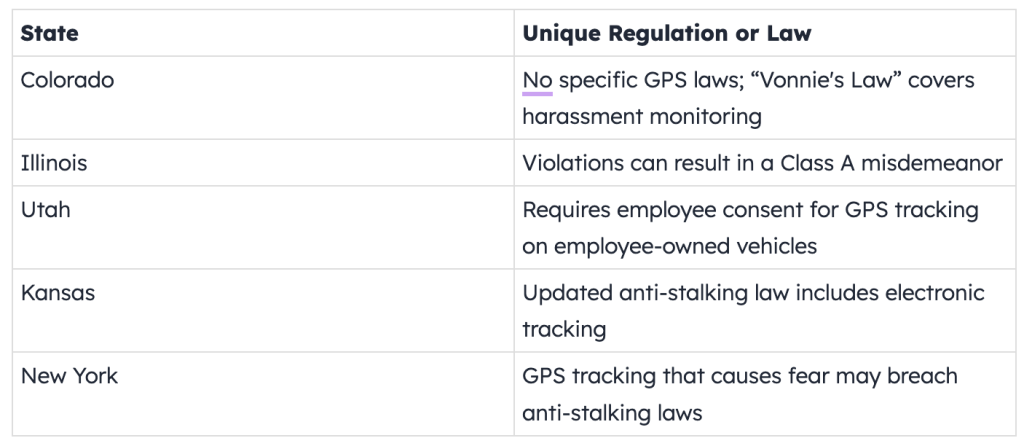
The legal framework for GPS tracking in the workplace is complex and state-specific. Although there are no federal laws that uniformly establish one national standard, both federal and state laws provide documentation of what is acceptable or not. That’s where the Electronic Communications Privacy Act (ECPA) comes in.
It does narrowly permit tracking of company-owned vehicles for legitimate business purposes to improve operational efficiency and safety. When vehicles are owned by employees, it is a different story. Employers need to demonstrate a clear, business-related reason and have policies that respect privacy.
Missouri and Texas, for example, have allowed the use of GPS in vehicles owned by businesses. That’s because they deny privacy invasion as a defense. However, each state has its own legislation. In states such as Nevada, Vermont, Idaho, and Oklahoma, you will not likely find bans on GPS tracking.
This scenario underscores the need for companies to educate themselves on their local laws.
While employers are within their rights to monitor company vehicles, tracking employees’ personal vehicles is a different issue that needs to be approached with caution. Underlying restrictions usually focus on consent and whether a legitimate business interest outweighs a consumer’s right to privacy.
Employers should notify employees about tracking practices and get consent, particularly for personal vehicles. That balance is incredibly important. Tracking may help businesses be more efficient, but it should go hand in hand with respecting employees’ privacy.
Legal challenges can occur when tracking exceeds these limits, so keeping consent and clear policies at the forefront is crucial.
Obtaining clear and affirmative consent from employees is essential to the legality of GPS tracking. Employees are entitled to certain rights with respect to their location data, which require employers to be transparent.
Consent is relevant to legal standing. Consent represents an affirmation and understanding of tracking practices. Being transparent builds trust and helps avoid future conflicts, making sure the technology is implemented properly and respecting privacy guidelines.
Enterprise-level companies, are a great example of successful tracking, processing more than 500 million miles per year. Trust and clear communication are critical components of these practices.
Understanding state laws
State laws on the use of GPS tracking differ drastically, showing distinct cultural differences in respect to privacy and employee rights. Most states recognize the key role of employee consent and transparency.
Utah, for example, states that employers must obtain employees’ express consent prior to installing GPS devices on their vehicles. This highlights a common theme across several states: protecting employee privacy while allowing legitimate business needs.
Employers are facing significant changes, and those who do not remain up-to-date and evolve accordingly can face serious legal repercussions. This is especially important in states with rapid developing laws, where businesses need to be quick, flexible, and well-informed to be able to adapt and comply.
States with particularly interesting laws are Colorado, Illinois, Utah, Kansas, and New York. Colorado’s “Vonnie’s Law” tackles stalking through vehicle tracking, but does not include specific GPS provisions.
In Illinois, failure to comply is a Class A misdemeanor. Kansas just updated its anti-stalking law to include electronic tracking, an example of the trend toward more stringent definitions of privacy infringement.
Such differences create a patchwork quilt in which multi-state employers must traverse an increasingly difficult legal labyrinth. Compliance is more than just the federal side of the law—it’s knowing and abiding by each state’s unique rules and regulations.
Carefully crafted policy is key, making sure that something like an operation in New York, for instance, doesn’t accidentally violate New York’s stout anti-stalking laws.
Other states, including Illinois and New York, impose harsh GPS tracking rules. Employers in these areas have a lot at stake, including possible civil penalties for noncompliance.
Creating customized compliance strategies would be key. For example, employers could pay particular attention to consent procedures in Utah, which explicitly requires an employee’s express consent.
An understanding of these state laws will go a long way towards developing employee monitoring practices that stay within the legal lines and guard against future litigation.

Best practices
A strong, holistic policy establishes clear parameters for tracking, including why and how it is important. It outlines which days tracking is to be conducted, along with data collection and management procedures.
It needs to provide a complete picture of employee rights, require affirmative consent from employees, and hold up to legal scrutiny. Aligning data-sharing policies with federal and state regulations is extremely important, as it prevents legal troubles and fosters trust.
For example, limiting tracking to only during business hours both respects employee privacy expectations and complies with legal requirements. Having a clear, thorough policy available to everyone creates a sense of transparency and trust.
Properly educating employees about GPS tracking is important not just for compliance, but for creating a trusting and respectful workplace culture. Address issues such as why you are tracking them, how the data will be used, and what protections are in place.
Workshops can illuminate bad practices, allowing for a proactive approach to any issues. Effective communication focuses on the valid business purposes – like confirming hours worked – without infringing on personal use.
When employees are kept in the dark, they don’t feel valued or respected, which lowers morale and trust.
Written consent is the foundation of ethical GPS tracking. Approaches for collecting and recording consent range from extensive documentation through paper trails to electronic contracts.
Frequent conversations help you stay in step with your evolving policies as laws change, allowing you to proactively avoid legal pitfalls. Beyond compliance, consent builds an organizational culture that promotes and protects employee rights.
Ensuring GPS data is secure is the bottom line. Use practices such as secure storage, limiting access, and encryption to protect data.
Regular audits keep security measures up to date and ensure that no unauthorized intrusion occurs. Employee training on data privacy is equally important, as it equips them to handle sensitive information with care.
- Use robust passwords and authentication processes
- Limit data access to authorized personnel
- Regularly update security software
- Conduct routine security assessments
Establishing clear boundaries around the use of GPS for tracking is critical to fostering a trusting workplace culture. Set clear policies about how and when tracking will be used, and be transparent about it.
Clear and open communication means employees are informed about what to expect, further building trust. By establishing these limitations, employers can address privacy concerns and still meet business objectives.
Methods to detect GPS devices
Checking for GPS tracking devices is both practical and straightforward. Employees should start by doing a detailed walk-around of the vehicle. Check beneath the seats, under the dashboard, and inside your glove box. Look for new or suspicious wires, boxes or devices that look out of place.
Pay special attention to the darker areas with a flashlight. Specialized tools, like GPS trackers detectors, can help find any hidden devices, too. These detectors, which are commercially available and used by some private investigators and smart city planners, can detect signals emitted from tracking devices.
Frequent vehicle inspections should become a part of the regular maintenance routine to detect any unauthorized installations before they can be exploited. Identifying common hiding spots for GPS trackers is key. Such spots frequently involve the undercarriage, behind bumpers or inside the vehicle’s electronic systems.
It is critical that employees stay educated and alert to these possible tracking spots to further protect their privacy and corporate assets.
Here are some warning signs that you might be the target of a vehicle tracker. Listen for strange sounds, especially when the car is turned off. You may start to see an extreme decrease in battery life and/or unusual increases in data consumption.
Here’s a breakdown of these signs:
- Unfamiliar devices or wires found during inspections
- Changes in vehicle performance or battery life
- Increased data usage on a connected car system
Changes in the vehicle’s behavior may indicate that tracking technology is being used. For example, unexpected battery depletion or unexplained electronic issues are major warning signs.
This is why it’s critical for employees to be on the lookout for these signs and report any suspicious findings immediately. This proactive approach protects privacy by ensuring that tracking is consistent with company policies and legal requirements.
Employers looking for alternatives to GPS vehicle tracking have many attractive options. These include:
- This technology implements tracking through the use of unique tags that can be scanned to instantly track location and activity.
- These require employees to report and check in on their activities and locations, making it an easy and powerful tracking tool.
- This involves collecting data from vehicle sensors to monitor usage and performance.
- Time and Attendance Software: Buddy Punch has a free 14-day trial that requires no credit card. This program makes it easy to monitor employee activities without using GPS tracking.
Each approach has its advantages and disadvantages. RFID offers accurate tracking without the privacy invasion but does need an upfront investment in tags and scanners.
Manual logs are inexpensive and easy to implement, but they depend on employee integrity and effort. Businesses should be intentional about choosing tracking methods that serve their business needs.
They must follow the law, including Missouri’s permission for GPS tracking and Connecticut’s Electronic Monitoring Act.














